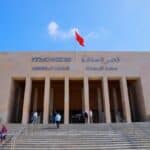Kinshasa, 12 January 2015 – Overpopulation, poor hygiene, no healthcare, little food… the situation for detainees in DR Congo is very concerning. In order to combat the conditions of detention and their impact on prisoners’ human rights, Avocats Sans Frontières (ASF) and RCN Justice & Démocratie (RCN J&D) jointly organised a round table on the “Right to justice: detention in the Democratic Republic of Congo”.
In DR Congo, overpopulation in prisons is regularly around the 400% mark. Whether in preventive detention or sentenced, detainees are often victims of infringements on the most fundamental of their rights: they do not have access to either food or healthcare and live in a dangerously unsanitary environment. Furthermore, many are detained in an irregular manner and do not have access to the judicial support that would allow them to assert their rights.
Joséphine Mfulu, member of the “preventive detention” pool at the Bar of Kinshasa-Matete, supported by ASF, confirms the situation: “Seventy per cent of detainees at Makala central prison are in preventive detention. Everything is bartered: from getting a bed, to making a phone call or getting a chance to wash. Detention should be the exception, freedom should be the norm.” This is also emphasised by Gaëlle Vandeputte, RCN J&D’s Head of Mission. “Detention in DR Congo violates the fundamental freedoms enshrined in Articles 5 (on torture) and 9 (on arbitrary detention) of the Universal Declaration of Human Rights.”

By bringing together the various stakeholders working on issues related to the penal system, at a round table event during the recent World Human Rights Day, ASF and RCN J&D alerted national and international authorities to the conditions of detention in DR Congo and the need for support to improve these conditions. Josselin Léon, ASF Head of Mission, called on Congolese civil society to fight for the protection of fundamental freedoms.
Although the Congolese state has demonstrated a willingness to improve the situation, the participants all spoke about the lack of resources and the delays in implementing measures. According to Emery Bukasa, Coordinator of SOPROP (Solidarité pour la promotion de la paix in DR Congo), “The recent law on the protection against torture makes this act an imprescriptible offence. But this law takes time to implement and, to date, it has resulted in very few convictions.”
A similar situation was noted by Sylvie Ntumba, member of the Kinshasa-Gombe Bar supported by ASF, on the issue of children in conflict with the law: “The current law on the protection of minors provides a range of measures for placement and custody within private households. Unfortunately, many minors are still placed in a separate block in the Makala prison in Kinshasa.”
As His Excellency Michel Latshenko, Belgian Ambassador to DR Congo reminds, “There cannot be any development without justice. It’s why we support organisations such as ASF and RCN J&D that are fighting for the respect for human dignity in the Congo.”
Cover picture: The prison of Beni-Butembo, North Kivu © ASF



